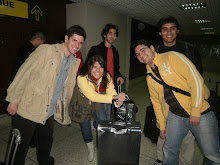Whenever knowledge is perceived in terms of power and the need to “defeat” overcomes the will of learning, of teaching and innovating through the making of contributions that will at last construct, any intellectual exchange will be drastically limited. And the seriousness of this scenario is not the limitation of the exchange per se, but the fact that the futility of this trading becomes noticible when it's obvious that the only useful thing that can be taken from it (and will only be taken by an intellectual, if involved), is the knowledge of with whom trying to engage in an intellectual swapping would be a total waste of time.
An interlocutor (which we will not define as rival, comrad or pupil), always provides us with a learning opportunity, either by bringing something we did not know about, bringing something we knew about conceived from a different perspective, by asking something that could make us question a before unquestioned matter (initiating a new learning and discovery process) or by making us review information and strengthen our own knowledge the moment we come up with an answer that would dissipate the question itself.
When the knowledge interchange is based on a power struggle, on the quest for the victorious and the defeated, once the real knowledge runs out, musings and ramblings begin to emerge with no other end than reinforce the illusion of knowing more than what one knows for sure, causing the rival's confusion in order for them to admit (the rival or the audience) the opponent's defeat. Before ramblings began, the few or many wise thoughts that could have featured along this battle of monologues, not only do not go anywhere but, best case scenario, they stay exactly where they came out from (lying within whom already “owned” them) and exactly as they were, remaining untransformed. They will not extend, they will not evolve, they will not spread, they will not CONSTRUCT. In this terms, knowledge, as a general concept, turns out to be less than useless. Even debates, in which the background can be interpreted as a struggle, if held between real intellectuals with a constructive purpose, the exchange is established in a way that, though each participant can maintain their position, each can also enrich their own perspective based on the contender's, preserving all respect and admiration for the opponent, the disposition to receive and transmit, the freedom to agree or disagree and the satisfaction of learning/teaching.
It would be important then to signalize who have we been calling intellectuals throughout these lines. A highly retentive, deeply analitic, creatively unlimited mind, just won't do it. The love for knowledge itself and its evolving potential to transform and create in a powerful recursive way, is key… the admiration for knowledge's own life, more than the fascination of owning it and using it against our peers.
“First world minds”, which I don't intend to define by the country they're living in but for the potential they have to bring ANY country to the first world, are intellectual minds. Brilliant, constructive, respectful (and even enthusiasts) of opposing views and debates; minds giving ideas with mere passion for watching them transform and grow together with different ideas, that eventually will become a form of wisdom that will be spread throughout time and generations increasing its creating and innovating capacity as historical, social and technological contexts change. Minds transforming ideas in realities that develop further with more ideas (either of their own or shared).
So static, cornered wisdom will eventually (and at considerable speed), become obsolete in the face of products arising from the knowledge networks intellectuals build. Then the key would be orienting knowledge to the conformation of wisdom based on the knowledge of a whole community (with a dosage of altruism, espirituality and profound intellect). Wisdom constructed on the foundations of preexistant cells that associate with new cells (or not so new but just brought to the construction context) to create structures increasingly powerful themselves (enphatically pointing out the power of the created structures more than the power of those credited for creating them); structures capable of benefit in various ways the whole community that contributed to their creation a even trascending the frontiers of just this community benefiting more and more of us. Structures that will also enable (and catalyze) new constructions and further evolving learning processes.
It would then make sense to think, that in this era of rapid and radical changes, where 40 exabytes (4x1019) of new information are generated each year and it is presumed that in less than five years computers will exceed the computing capacity of our own brains, this is the ideal way of creating or CONSTRUCTING; verb that has been intentionally emphasized along these lines linking the intellectual exchange with the foundations of a world where there's no way that just a few of us can master all existent knowledge, not casually exalting the concept of “constructivism“. Constructive vs. destructive in a positive vs. negative sense, as in the terms “constructive criticism” and “destructive criticism”… Products resulting from this constructive proposal would not only evolve with increasing rapidity, but they would also be of a quality hardly surmountable by products derived from knowledge structures authored by just a few minds. Highly gifted, brilliant minds for sure, and maybe aided by more robust investigation and development methodologies, but minds at last less altruistic and oriented towards making knowledge a property.




No comments:
Post a Comment